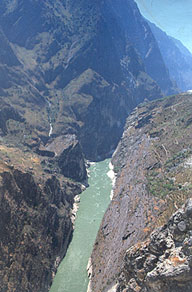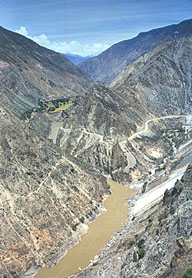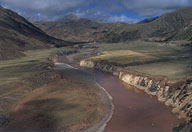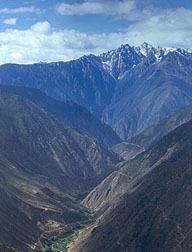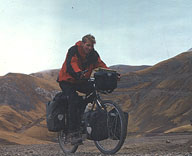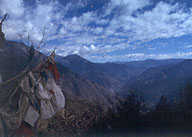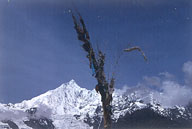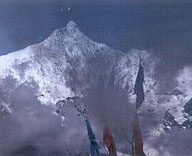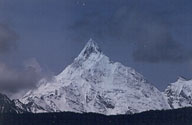Chapter 9 - Approaching Tibet
Sleep last night was a rare commodity, not because of anxiety-ridden apprehension at tomorrow’s ascent but because of events during the night. First, it was noisy neighbours, doors wide open, TV on full blast, their shouting echoing and loud along the bare corridors. Ian several times, irate with frustration at not being able to get to sleep, jumped out of bed and rushed to the door with the intention of giving them a piece of his mind. But each time he stopped short, perhaps realising the ridiculousness of the situation: an Englishman clad in boxer shorts, ranting in English to a group of Chinese unable to understand a word of what he was saying, and not caring if they did.
The second event of the night was as a result of sleeping with the window open, preferring to be deprived of sleep by noise rather than oxygen. Sleep was fitful and in the early hours of the morning I thought that I saw a figure at the window which opened on to the corridor, a vague rustling behind the curtain. Uncertain, and not wishing to make a scene if it had been nothing, I got out of bed and crept slowly to the window and tentatively pulled back the curtain to see a man quietly rummaging through one of Ian's bags. Without thinking, I yelled out in a ‘what the hell do you think you are doing’ manner and grabbed the man's hand through the open window. He jumped with surprise, startled fear in his eyes, threw the bag at me, wrenched his other arm free and scampered off down the corridor in panic. Equally startled, I rushed after him in the darkness, sending the thermos crashing to the floor in a tinkle of shattered glass. Poor Ian, probably having just got to sleep, awoke with a start to this clatter and confusion.
The would-be thief fled down some stairs and not wanting to go overboard on the heroics, I turned back and tried to put the bemused Ian in the picture before I went of to report the matter to whoever I could find. Two men begrudgingly came back upstairs with me, suspicious and doubtful that this lanky foreigner wearing only boxers and babbling a few words of Chinese about there being a theft was of sane mind. I showed them our room, flooded with water from the smashed thermos, and tried to explain what had happened. They looked blankly at the both of us.
I took them to the stairs where we gingerly descended into the darkness, not knowing what to expect, only to find the culprit cowering meekly behind some boxes at the bottom of the stair well. A few barked words from one of the two men with me and he came out of hiding without any resistance, humble and apologetic, begging me for forgiveness. I wanted little to do with the matter, leaving it in the hands of the ‘hotel’ staff, in the knowledge that the Chinese have their own way of dealing with such things. I also realised that if I pressed the matter further, the police would become involved and the punishment would be far greater than his crime of attempted petty theft. Our next door neighbour, dressed in white pants that were sexily tucked into his white vest, had come out to see what all the excitement was about but seemed disappointed by this anti-climatic ending.
Fuzzy with lack of sleep and wondering what effect this would have on our energy reserves, we left at nine o’clock, pedalling slowly uphill, mindful that it was going to be a long day. We cycled through a steep, narrow valley, brown tears of mud evidence of landslides and the falling trickle of stones proof that not all was settled. At one stage we were stopped for several minutes by a brigade of road-workers trying to shore up the hillside high above the road.
Forty-five kilometres out of Qiaotou we were still climbing. I knew that there was still another fifty kilometres to Zhongdian, but dared not think how much of that was uphill, surely there could not be more climbing. To add to my fears and worries, my toes were numb with cold. This was our first experience of low temperatures, but the cold did not concern me as much as the altitude and I began to be worried that the numbness was induced by the altitude. My mind started playing cruel tricks about altitude and my inability to cope with it. How much more would we have to climb?
Nearing the point of despair, the point where the mind can no longer cope with the physical exertion, not knowing when it will end, how much more of this had to be endured, we reached the summit, or rather a summit. Below us stretched a wide, arid, rolling plateau that belonged to a different world from the one that we had left some fifty kilometres ago. It was though the summit was a demarcation post, a point of change in culture. The houses here, few and far between in small villages, were bigger and taller, Tibetan in style, flat-roofed and with whitewashed walls. The buildings seemed more at one with the scenery, made of sun-baked bricks, no ugly stains of concrete or blue glass. The people looked different, smiles were warmer, cheeks cracked and red, blasted by exposure to wind and sun. Their clothes were heavier, more substantial, with a more earthy feel and look. Even the livestock was not the same, the predominant animal being a dzu, a cross between a bull and a female yak.(This animal is vitally important to the Tibetans but is also not without its uses for those of you who play scrabble – remember it well, not least because it can also be spelt with dzo). The windswept blots of land were brown and barren in comparison to the productive green of the paddy fields below, staples or rice and wheat replaced by barley. Large dogs were in evidence, barking protectively.
The contrast was striking. After the enclosed narrowness of the valley, the openness of the plateau was uplifting. The change in culture, architecture and farming was remarkable. It was a thrilling experience, as if we had stumbled upon a hidden lost world. With spirits buoyed the rolling ride to Zhongdian was effortless in comparison to earlier, despite the gradual uphill and the annoyance of ravines. My change in heart was absolute and completed by seeing a large bird of prey, a huge brown eagle with an impressive wing-span. It soared with majestic, powerful grace, deigning to swoop by and give us an even closer look. In awe we gaped and admired its regal flight.
Thus the ninety-seven kilometres to Zhongdian was not as bad as we had feared, certainly not as bad as the French cyclists had implied yesterday. Zhongdian itself was more modern and built up than I had expected, even having an airport under construction on its outskirts. We later learnt that two-thirds of Zhongdian has been built in the last year and a half and the opening of the airport means that trend is set to continue. We quickly found a bed for the night in a nondescript hotel and went to fill our stomachs. The AAA cafe, described in guidebooks as a backpacker cafe, pandered to travellers in terms of its menu, but the clientele were all Chinese. The room dimly lit, had a wild west feel to it as groups sat in corners playing card, minding their own business, waiting for something to happen. Fortunately, little did happen, we were not asked to hand in our ‘pieces’ but ate our meal in peace and then retired for a well-earned night's sleep.
*
Zhongdian is at eleven thousand feet and the increased elevation has meant that shorts and t-shirts have been hastily abandoned and replaced by warmer gear. I think that it is an icy taste of temperatures to come, though we were told today that such cold weather is unseasonable - I hope that this information has been passed on to those in charge of the weather or else we are in for a chilly time of things.
The morning involved meeting various people, trying to obtain a permit, authorisation, to travel in Tibet or at least ways of going about doing so. Yet at each turn we drew a blank.
“No individual travellers allowed in Tibet,” said the man from Zhongdian’s China International Travel Service with bluntness that is second nature to Chinese officials when dealing with foreigners who ask too many questions.
“But we are travelling together as a group,” was our pedantic riposte.
“Minimum of five people in a group,” was his smug reply.
“If we find three other people in Zhongdian, then we have a group.”
“Group not allowed to enter from this route. Here, Tibet border closed to foreigners. Have to go to Chengdu,” answered the official becoming increasingly irritated by our presence. So great was his frustration with us that I half expected him to blurt out, ‘Bah, you pesky kids!’ as the baddie always does in Scooby Doo.
Not the most positive of news, but we expected little else. We had resigned ourselves to ploughing on and chancing our luck with the authorities further down the line, at worst we would be turned back and have try again from Chengdu, a detour that we could do without. My frustration at the thought of failure is best expressed by an extract from my diary:
‘Much of me thinks that we have been foolish, certainly somewhat naive, to have come so far without seeking such permission much earlier. An oversight, but perhaps one that would have borne little fruit. I hope that by some means, foul or fair, that we do make it to Tibet; reaching the source would be an added and certainly unexpected bonus. From the very outset of the journey I have felt and believed that Tibet will be the most challenging part, the most physically demanding, the most culturally different, the very crux of the expedition. Not to reach Tibet would be hugely disappointing for that reason alone. There would of course be the huge disappointment of a task unfinished, a dream unfulfilled, especially so for Ian, the whole trip being his brainchild.’
The rest of the day was spent soaking up the wild-west atmosphere of Zhongdian, home to the volatile and unpredictable Khampas. Despite the hardy image of the Khampas, the old town is sleepy with smoke drifting lazily from crooked chimneys. The houses crowd together separated by narrow winding paths that are as uneven and haphazard as the houses that surround. The houses are heavy wooden buildings, the years taking their toll as walls strain under the weight of roofs on the verge of collapse. Stones lie on the roofs to keep the wooden slates in place, moss meanwhile gathers in guttering and above gateways. Small dogs bark protectively from the security of a balcony. Pigs grunt greedily in their sties. Firewood is stacked expectantly against once whitewashed walls. There is an old charm, as sense of community and earthy feel that is very much part of Tibet.
In stark contrast, I was disappointed by the sterile concrete of the monastery. Yet that was my impression from outside, not from within, where the experience was far from bland. My nostrils were filled with the queasy, slightly rancid smell of yak butter candles, my ears filled with the monotonous, sonorous chanting of a monk and my eyes filled with the riotous blaze of colour despite the dimness. Here was an authenticity that the facade of outside lacked and I was enchanted by it, so much so that it took me a while to notice the presence of a monk standing by my side.
We said nothing, stood in silence. Time passed slowly. We both stared at the mantra in front of us. He moved and I moved with him. It was not at first a conscious action but I soon began following him around the hall, but still there was silence. Outside in the light we tried to converse, but he only spoke Tibetan and did not understand my Chinese, so he motioned “Would you like some tea?” I nodded and was escorted upstairs to his shag, or bedroom.
His face was creased with years, his smile warm, and his eyes wide, full of experience and experiences. We sat either side of a small brasiere on which he placed a blackened kettle and then began making tea. The process was protracted with butter, hot water and a few herbs being placed in a small jug and then heated. The contents of the jug were then transferred to a mini-churn made of bamboo, in which the old monk skilfully churned the tea for several minutes. Back in the jug and a little more heat before it was strained and served. After so much work the end product might have been a little more palatable, it had an off-yellow colour, the texture of soup and the taste was greasy and oily, unsettling to my delicate western stomach. It was not as rancid as I had expected but not something that I would drink out of choice, having said that in a week or two we will probably be craving it. If the experience of the tea itself was not that great, then that was not so of time spent with the monk. I felt genuinely privileged to share his company, his presence was humbling yet very settling, and that is not western adoration of something totally alien, that I had only previously glimpsed through the medium of television.
The afternoon’s experience of the Songzanlin temple, the largest Buddhist temple in Yunnan built in the Qing dynasty in 1679 by the Fifth Dalai Lama, was not as profound. The monastery complex nestles at the foot of a series of hills, a small plain stretched out in front of the gates. Tall wooden racks in the foreground of the monastery look menacing, at odds with the perceived calm of the monastery, these racks look like wooden missiles, but the reality is more harmless, they are for hanging hay. The buildings within the complex are tall, imposing with walls at a slight angle, not unlike an Egyptian temple such as Edfu. Colours are subdued and natural, a feeling of harmony, the faded reds of rafters, yellow grass sprouting from tiles, the worn white of walls.
If the buildings on the periphery retain a certain dignity, have warmth, then the main halls have lost such humility. They are hollow and lack any profundity with no feel of monasticism, the monks in each hall merely helping or advising ignorant tourists, not unlike guides at the British Museum or National Gallery who sit patiently in a wing for hours on end. I was overpowered with a feeling not of religion but that these buildings were relics of the past, a living museum that had been rebuilt and repainted to accommodate the mass of marauding minibuses. There was much construction going on around the complex, possibly making amends for the Cultural Revolution, definitely made for the tourist revolution. Buddhism stands little chance in such an atmosphere where the smell of new paint is more powerful and pervasive than the stench of yak butter candles.
To make matters worse the Chinese had little clue as they trudged around the monastery, little sense of the religious. One man even saw fit to hoick and spit in the main hall. Others stuff money into collection boxes, not because they are Buddhist but in the hope that their success and prosperity will continue, their money multiply. Others are forced to buy a joss stick from an insistent monk, then stand there lost, in total bewilderment like a child not knowing what to do next. Perhaps such confusion is understandable as religion and the visiting of temples has only recently come back into vogue. What is more I doubt that I would know what to do in a Church of England service, the only occasions on which I have been to church in recent times are weddings and sadly funerals.
High above the main hall is a stuffy, elaborately decorated little sanctuary where the groups of overseas Chinese tourists would flock to prostrate themselves before a small gold statue of the Buddha. Again there was uncertainty in their movements, questioning looks cast at the monk, direction being sought. Their prostrations were slow and foundering in complete contrast to those of a young monk who was having to perform as many prostrations as there were beads on his rosary, probably about forty. He dove into the task, flinging himself into prostration after prostration with so much physical vigour that he would not have looked out of place in 'Superstars' or some press-up marathon. Not surprisingly his triceps were well developed, testament to his religious faith.
Despite such religious exertion the halls and temples made me feel slightly uneasy. It was not the smell of paint or candles, but the lack of devotion in evidence. The final straw was an old monk grabbing at my backpack and asking for money for a photograph that I had taken. I am always wary when I have my camera, am judicious in its use and try not to cause offence, and thus was a little surprised by his reaction. The photograph that I had just taken had been outside, taking heed of the ‘Photography Inside the Halls is Prohibited’ signs, and I felt that the monk was just trying to chance his hand. And a strong hand he had, for it was with some difficulty and not a little effort that I managed to extricate my bag and myself from this unpleasant situation. I sought sanctuary outside the complex, where the prayer flags seen in the distance on the hill tops were a more powerful witness to faith, to the passion of pilgrimage than the emptiness of the halls within.
*
The next day as we climbed slowly out of Zhongdian, our thoughts were as unsettled as the weather; we knew roughly that we had a climb, a drop, a huge climb and then a small drop, but the extent was not clear from the maps that we possessed. Yet it was the weather rather than our state of mind that was more awkward. When not cloudy it was warm and layers would be shed, but when the skies darkened and the clouds closed in the temperature dropped swiftly, allowing for no middle ground, only extremes of temperature. Cycling uphill required more effort and we became too hot. Whereas downhill speeds led to a biting wind chill factor and the need for more layers. To try to combat such uncertainty, for the first time I was dressed in long trousers and was armed with my Lowe Alpine inner fleece, both of which helped to mediate between the two extremes.
The climb out of Zhongdian left behind the tarmac and with it the traffic. Thus as the road wound its way slowly through forests of pine and steep hills, we were able to enjoy the space and tranquillity to ourselves without the intrusion of horns or choking diesel fumes. The far away tinkling of bells, of dzu grazing anonymously amongst the trees, let minds wander. “The bells sound like the Swiss ski team,” said Ian dreaming of more pleasurable pastimes.
The road took us up to a pass and then rushed back down to the valley floor with precipitous haste down a series of hazardous hairpin bends, the steepness of the drops most unsettling. At the bottom of this dramatic gorge we then followed a rushing mountain stream until it made contact with The Yanngtze, or Jinsha River as the Chinese refer to it as this stage. Here we turned north and for the next seventeen kilometres to Benzilan the road ran upstream of the Yangtze. The views and valley were quite simply breathtaking, stunning in their majesty. I tried for adjectives less used, but everything else seems inadequate. The mountains each side were not vertical, as at Tiger Leaping Gorge, more gradual in their incline, not unlike, but more impressive than the Indus valley on the lower stretches of the Karakorum Highway. As Ian kept on pointing out to the camera in his Pythonesque humour it was “the wrong river”, but I did not care for its beauty was spectacular, for me the crowning sight on probably our best day's cycling in terms of scenery.
Benzilan is a small, sleepy town some 85 kilometres from Zhongdian, overlooking the Yangtze, surrounded by terraces, graced by attractive Tibetan style houses and dominated by mountains. It is a little oasis that has thus far escaped the notice of travellers and backpackers. Long may that be so, not because I wish to deny others the enjoyment that I derived from our stay there, but because I wish it to remain the same, untouched and uncorrupted by outside influences. We stayed in a small guesthouse for thirty yuan for the night that was threadbare in comforts, basic in facilities, but had the most wonderful views. The hospitality and the generosity of those in charge was second to none - they offered us biscuits, washing powder and would go to great lengths to help us. The offer of biscuits and washing powder was perhaps a reflection of our appearances, underweight and dirty, but more than anything summed up their kindness. Benzilan was a fitting end to a great day.
*
A delayed start as Ian went in search of fuel for the stove, it being inevitable that we would have to camp tonight there being 104 kilometres to Deqen, seventy kilometres of which was uphill to a pass of over 15,000 feet. As the road made steady, but ever upwards progress I was again thankful that the road was dirt, not this time because there was less traffic, but because the gradient was not as fierce as it might have been had the road been tarmac. Yet still, we were soon high above Benzilan with an eagle-eye view of the picturesque town - but this was nothing in comparison to what lay ahead.
Some two hours out of Benzilan I cycled past a Chinese cyclist who I presumed was simply travelling from one village to another, a matter of minutes, perhaps an hour or two at the most. My presumption could not have been more wrong in its own arrogance, could not have been more patronising. It turns out that this young man, slightly older than Ian and myself at thirty-four, was cycling all the way to Deqen and then on to Tibet. His black plastic slip-on shoes, faded jeans, satchel strapped to the back of his bicycle that had no gears and a chain that creaked and groaned as if on its last pedal, put our twenty-four gear bikes and mountains of gear to shame. We thought that we had been worthy recipients of local adulation and admiration but it was this man who deserved all the praise and encouragement, not us.
We lunched in a small shack that was dimly lit with walls plastered with newspaper to keep out the draughts and low wooden tables and stools from Lilliput. Inside was a monk who had an obvious penchant for food and gathering from the way in which he grabbed Ian's camera and with a little direction began snapping away, a passion for photography. As we slurped our noodles with noisy relish, a bad habit acquired from too long in China and will no doubt be hastily corrected by table-manners-obsessed mothers on our return, the crazy Chinese cyclist joined us. He began an interrogation, a question and answer session in his difficult to understand Chinese.
“Where are you from?”
“England.”
“Where have you cycled from?”
“From Vietnam. But in China, from XiShuangBanna.”
“How long has that taken you (from XiShuangBanna)?”
“Three weeks,” was my rough spur of the moment estimation that hopefully allowed for days off. In hindsight I think that in actual cycling days it is eighteen.
He scoffed with laughter at this. I was a bit taken aback by his dismissive reaction as most people are usually full of praise for our efforts, especially if they have any knowledge of the terrain and conditions that we have encountered. I let it pass.
“How many kilometres do you cycle each day?2
“About eighty,” was my rough estimate.
A scoff. This time I could not let his snort of derision pass without comment so asked him, “Why? How far do you cycle each day?”
“140 kilometres,” was his proud boast, which he then preceded to show me on a map. I do not doubt his claim to 140 kilometres, but feel that he is being a little economical with the truth and that it was a personal best rather than a daily average. I felt tempted to trump him, by playing a joker, but that would have been petty-minded; I had to recognise that his feat was impressive, especially given his heavy, antiquated Chinese bike. I was further impressed, if not a little dubious of his sanity, when he explained that he had travelled all the way from his home in southern Tibet to Kunming by bicycle to go sightseeing. He even had the typical tourist photos to prove that he had made it to Kunming. He was not a likeable man, somewhat terse in manner and full of his achievement, but with due cause, and I could bear no grudge against his abruptness, especially as he had paid for our lunch unbeknown to us.
As we left our lunch stop, the locals warned us that there was still a further forty-five kilometres to go until the top of the pass and that there were no food or drink stalls between here and Deqen. We nodded our heads in that ‘we have heard it all before, but thank you’ manner and left with a wave and a smile of thanks. As is always the case, like children not heeding parental advice, the villagers were not wrong and we had been over-confident in our ability of reaching the top of the pass. So too for that matter was our crazy Chinese cyclist friend, whose name I unfortunately did not find out, for we last saw him waving at us from the back of a Mitsubishi Pajero that had spared him the freezing cold of the top of the pass. “I'm glad that he did get a lift or else he would have been sharing our tent with us. Two is company, three is a crowd,” said Ian dryly.
A small glade of soft, but not muddy, ground, surrounded by pines and the blaze of colour of rhododendrons, a stream running nearby, was our campsite for the night. Tent pitched, panniers unpacked, firewood collected, it was “Time to get the stove working.” “Too right, time for a warming mug of soup.” At such times of tiredness and cold I am constantly amazed by the restorative powers of hot drinks such as soup - even the thought of them warms the heart and mind. But the belching black smoke from the stove did not look promising, indicating that the poor quality of Chines fuel might mean that we have to wait a while before we can get any heat. Amidst much cursing and disappointment, Ian abandoned the stove and turned to the good old fire as a source of heat for our sustenance.
The fire, after a wet and smoky start, proved to be our salvation, and a couple of mugs of soup and an army ration chicken and pasta later we were replete and content. In the fading evening light, the mountains just above us were shrouded in a damp mist, and I could not help but appreciate the remote beauty of our spot. Duly inspired by the solitude and scenery of our campsite, we retired to the tent, and I went on to inflict my first, and may I hasten to add long overdue, victory over Ian at Scrabble.
*
Any warmth and comfort that we derived from the fire last night failed to materialise this morning. Overnight rain, heavy dew and the clinging mist defeated all our valiant attempts to get a fire going and have some breakfast before the uphill onslaught. A packet of Chinese biscuits and some cold water had to suffice.
The going was slow, not because of the altitude, but because of the drizzle that turned dirt to mud, that sucked and slowed weary wheels. Progress was laboured, but not exhausting, no shortness of breath and no headaches. As the weather turned from drizzle to sleet to snow, so did our luck.
“Justin,” a cry of frustration, tremulous traces of panic in Ian’s voice indicating that something serious had happened. I left my bike by the side of the road and jogged back down to help Ian, who was busy taking his panniers off his bike in the middle of the road on a particularly sharp bend. An indication that Ian was shaken and pissed off by whatever damage had befallen his bike. It was bad. His derailleur had snapped. No gears in mountainous terrain with a weight of luggage was not an attractive, to say feasible prospect. There was little that could be done there and then but to fudge a temporary fix that would get us to Deqen, and once there we could re-evaluate the situation and our possible options.
We bodged a ‘fix’ that would allow Ian to freewheel downhill and gave him the limited use of one gear. Ian by now had calmed down, indeed had become stoical of outlook, resigned to the fact that for the time being he would have to push his bike uphill. Despite this major setback he smiled and with good old British stiff upper lip, trudged defiantly through mist and snow, onwards and upwards.
Thus it was after some twenty-one bleak kilometres, which for some reason reminded me of Wales, we arrived at the top of the pass. The weather was not cold, but it was damp and unpleasantly so, perhaps why I was thinking of Wales. Apart from the obligatory photograph of achievement in reaching the summit we did not linger long, but began our descent. The downhill going was muddy and wet and by the time that we arrived in Deqen we were covered from head to toe in spots of mud. We were the laughing stock of Deqen, especially Ian who was so covered that one man thought that he had had a nasty accident, unable to restrain himself. But the mud was a minor irritation to the burning cold that stung our fingers. Our gloves, both inner and outer, had become dampened by the elements and thus offered little protection to the wind-chill factor as we sped downwards. Every five minutes I would have to stop and put my hands under my armpits for minutes to ease the pain, try to regain some feeling in my fingers and assuage the numbness of the biting cold. Can you remember the pain when younger of freezing hands on a sports field on a wintry January afternoon? It was much worse.
Impervious to the imperfections of Deqen, we installed ourselves at the first decent roadside restaurant that we came across. I ordered for us, heartily so, while Ian went in search of sweet fizzy drinks and biscuits. The biscuits that he returned with were locally made, moorish and to become a staple diet for the rest of our stay in Deqen. Duly satiated, sugar levels replenished, we were able to focus on the important task at hand, namely how to resolve the problem of Ian’s derailleur.
“We could bypass the derailleur by shortening the chain,” I suggested.
“No thanks. One gear, one thousand kilometres and one hell of a lot of passes to cross. No way,” said Ian shaking his head. Fair enough.
“Zhongdian?”
“There’s nothing there.”
“Kunming?”
“What go back and try and get a new derailleur?” A nod of agreement. The more that we looked into various options, pursued possibilities, the more it looked like a return to Kunming was our only real option, frustrating because it would entail an unwelcome delay of several days.
*
The softness of our beds was too comforting and we awoke late, just before eight, leaving little time for Ian to catch the bus. As we strode briskly uphill to the dreary courtyard that served as a bus station, we ran quickly through our unwritten checklist, running through various eventualities and confirming timings. We had decided that Ian should catch a bus to Kunming, where he could get a new derailleur, and head back as quickly as he could. I, in the meantime, was to scout out the road ahead. The lack of time kept the departure free from emotion.
Left to my own devices, I began to see Deqen in a different light, to see it for what it was - a border town overwhelmed by a sense of vagrancy. Crushed into a corner of a valley, steep streets, cracked and run-down, with little or no lighting, Deqen was a soulless mishmash of people. People awaiting a bus to the next town, people milling around, people loitering. I did not wish to tarry and jumped in a jeep heading out of town towards Yanjing on the Tibetan border.
Cramped and squashed in the back of the jeep even before we had left Deqen, I had an ominous feeling that this was going to be a journey of endurance. And yet, in spite of the lack of space, there was an immediate atmosphere of congeniality and camaraderie on board. Everyone looked out for each other. An old man with a smile of blackened teeth made it his duty to ensure that a boy strapped to the back of his father was protected from the elements. Whenever we passed someone on the road, the jeep would lurch to a stop and somehow room would be found. I felt as though we were on a Sunday outing such was the friendliness of everyone aboard.
The road descended some thirty kilometres back down to the level of the Mekong and then for the rest of the journey followed the river upstream to Yanjing. Our descent left behind the Han influence of Deqen as once more we were among Tibetan style houses. There is an impressive air to these white-washed Tibetan buildings with their flat roofs that gives them the impression of wealth, the appearance of spacious, airy villas. Pleasing to the eye, they seem at ease with the terraces around them, whereas Deqen with its concrete buildings and satellite dishes was not so.
Arriving in Yanjing I was certain of rebuttal, that there would be a checkpoint of some sort and that I would be sent back by an officious official for not having the correct papers. But there was nothing. Nevertheless I left the jeep trying to be as inconspicuous as possible, ignoring the attention and stares that my presence was causing. I felt like Bond in a 007 movie, Sean Connery of course, or Michael Caine in the ‘Italian Job’ casing the joint, as I sauntered around town trying not to give the impression that I was sizing up the town or trying to suss out its security. My delusions of film and sleuth were shattered when I discovered that the checkpoint into Tibet lay a few kilometres out of town. Oh well, I had enjoyed the opportunity to let my mind wander and at least I had accomplished my mission in ascertaining where the checkpoint was.
*
Not wishing to arouse suspicion by remaining in Yanjing, I awoke early the next morning to get a lift with a jeep back to Deqen. Overnight there had been heavy rain, a premonition of how quickly the roads can change and how dangerous they can become. Not long out of Yanjing we encountered a number of mudslides, becoming stuck in one. I could have blamed the driver for stalling the jeep in the mud, for not engaging the four-wheel drive, but having read that Tibetans in this area were friendly yet volatile, I decided discretion was the better part of valour and held my tongue. The driver seemed intent on digging his way out, a pointless task as the mud simply oozed back into any hole that was dug. I tried to mime the idea of using stones. Not that I know a lot about getting stuck in a four wheel drive, but I had seen the jeep drivers on the Karakorum do this, and they knew their jeeps, knew their landslides and importantly knew how to get out of them.
The driver abruptly shook his head at my suggestion and continued with his digging. Forty minutes later, both of us covered in mud, the jeep was still stuck. Fifty minutes later we started putting stones down so that the wheels would have something to bite against. Ten minutes later we were free. Again I said nothing, did not gloat, just quietly enjoyed the moment.
At one stage of the return journey the driver motioned for me to grab the wheel. Ordinarily I would have relished such an opportunity, but at the time we were doing 40 kph around a corner on a bumpy narrow dirt road with a two hundred-foot drop into the Mekong on our right. This toying with my nerves was just so that he could get some cigarettes from a pocket. It turns out that he was an erratic driver, the kind of driver who swerves deliberately in order to run over something on the road and who enjoys playing spin the wheel and more worryingly ‘Look Mum, no hands’. When we reached Meili Xue Shan some thirteen kilometres short of Deqen I could handle no more and asked to be dropped off.
Meili Xue Shan, Beautiful Snow Mountain, is a stunning mountain at 6,740 metres that has holy properties amongst the Tibetans who know it as ‘God of Snow Mountain’, and is thought by some to be the object of James Hilton’s Shangri-La in his book ‘Lost Horizon’. The mountain has never been climbed, in small part due to the hostile and ever-changing climate of the region. Today was a hostile day and with Meili Xue Shan shrouded in cloud the closest that I got to seeing Shangri-La was on the back of a ticket that would have cost me 10 yuan. I say “would have cost me”, because being half-Scottish, as well as stubborn, I refused to pay to enter the designated ‘sight-seeing spot’ being built in the expectation of this area opening up to tourism. Instead, I walked down the road and got an equally good view of a mountain covered in cloud.
Back in Deqen I phoned Uttara Crees of Gyalthong Travel Service in Zhongdian whom, unbeknown to herself, was acting as our liaison. She gave me the frustrating news that Ian would not be back for another two days. I found it difficult to be unable to do anything, to be stuck out here simply waiting around. Tomorrow I would travel south of Deqen.
*
Despite the warnings of the jeep-driver yesterday that the road south along the Mekong was dangerous, I felt certain that the scenery and the Catholic Church where I was headed would outweigh any such perils. I think that he was also trying to imply that the buses themselves were not safe and that I would be better off in his capable hands - seeing how little his hands touched the wheel yesterday I doubted this very much. Whatever, he was not wrong about the dangers of the road and the scenery did not disappoint.
The road was quite simply stunning. The drops were precipitous, even for any hardened mountaineer. The road was so high, so narrow and so precarious that the Mekong was a silent brown thread too far down to contemplate. The scenery was rugged, mountainous and awesome, so much so that it almost seemed unreal. I felt as though I was high above in an aircraft and not a rickety old Chinese bus that seemed to have little idea how close and how often it teetered on the edge of vertiginous drops. Landslides, huge falls of scree that tore all the way down the mountainside gave little assurance or peace of mind.
Thankfully my eyes and mind were distracted from some of the most hair-raising moments by the questioning of a curious peasant farmer. “Zhe shir shenme? Duo shao?” he was intrigued by everything that I had and wanted to know the cost of my clothes, what I did back in England, why I had come to China. But the question that really flummoxed me was when he asked me to tell him the title of the book that I was reading and what it was about. John Fowles’s ‘The Magus’ is not easiest to describe in English let alone in Chinese.
Eventually the terrain relented as mountains mellowed to impressive hills and bare slopes to a rich, comforting green. The valley was lush, the river more approachable. This remote region is the setting for what the locals refer to as ‘tian zhu jiao jiao tang’, quite literally the Catholic Church, located in a quiet village some eighty-three kilometres south of Deqen. The village is a picture of rural, pastoral bliss that with little outside influence must have remained unaffected and unchanged for generations.
If the village is an oyster, then the church is the pearl within. A square tower rising above the arched doorway dominates the front of the church. In contrast to the dwellings of the village, the tower, indeed the architecture of the church as a whole, reflects its European origins, the one concession to Chinese architecture being the upturned eaves on the roof of the tower. The nave is long and narrow, some forty feet in height, an altar at the far end, above it a round window - if it had had stained glass that would have been too much. Though a little unusual to see such a building in rural China, it was not the church’s architecture that struck or surprised me, but that it is still clearly used.
Christian posters and paintings filled the walls. The writings and script around such posters were all Chinese. The altar cloth had its usual cross in its middle, and either side were Chinese characters. At the back a tiny font in a niche in the rear wall. Ying and yang symbols dominated the ceiling. A figure of Christ dominated the far wall, above the altar, Chinese characters again either side of him. Amongst this curious mixture of Christianity meets the orient, I thought it a little sinister that the figures of Christ and the Virgin Mary were very much Caucasian in appearance. Christ and the Virgin Mary were just as they might be in a local parish church back in England, but that the lay people at their feet and the sinners in hell were very much oriental with Asiatic features.
I learnt from the old man who was showing me around, the keeper of the key whom I had rustled up from his home to come and open the church for my benefit, that the church was one hundred and thirty years old. Despite the age of the church and its remoteness (though this might have been its saving during the Cultural Revolution) the congregation still numbered one hundred every Sunday - a figure that many English parishes might be jealous of. There were no pews only low wooden benches, so low that they must have been for praying rather than sitting. It was an intriguing church and I would love to have attended a service.
Refusing a lift, I opted to walk the ten kilometres back to Yemen, where I would have to spend the night before returning to Deqen tomorrow. My spirits were buoyed by the delightful church and the tranquillity of the village that, with the exception of the cur that tried to nip my heels, was charming. Beaming from ear to ear, I arrived In Yemen several hours later expecting people to ask me why I looked so happy. Instead they chose to ignore me, preferring to concentrate on their cards or their knitting. They ignored me to such an extent that I became unobtrusive, a mother even breast-feeding her six month old baby next to me while I was eating. Being both English and a man, I tried to act as if this was perfectly normal and did not phase me in the slightest.
Then suddenly, having gone unnoticed for so long and having passed as part of the furniture, the mother asked me a question.
“Ni shi na guo ren?” Where are you from?
It was obvious that the question was directed at me, but I pretended to be engrossed in my food and made greater effort at slurping loudly. She repeated the question, this time tapping my arm to make sure. I shyly raised my head, careful not to stare at the baby suckling at her breast, and answered her question. My answer led to a torrent of questions that refused to leave me in peace, alone to eat my food. I missed Ian and realised that this was a hazard of travelling alone. That whenever you want people to notice you or to have someone to talk to and share experiences with, there is no one to be found. On the other hand, when you desire anonymity you are invariably besieged and become a focus of attention.
*
The bus back to Deqen was packed. A group of young women were off to the ‘big town’, their sacks and bags in tow. They chattered excitedly and continuously and stared out of the window with the fascination of first-timers. They were eager and full of excitement, everything was new and of interest, to be discussed, laughed about and enjoyed. Their bubbling enthusiasm even infected me and I began to look forward to returning to Deqen, not for Deqen itself, but of seeing Ian. I suddenly realised that I had not spoken English for almost four days.
“Ian, you're back.” Smiles all round. We were both happy to be back together, especially as Ian's gruelling mission back to Kunming had been successful. He looked tired and a little drained from having done battle with Chinese buses for four days, but with a new derailleur was ready to get underway tomorrow.
*
We climbed slowly out of Deqen to find that the Gods were shining on Meili Xue Shan which, free from the frustration of cloud, was bathed in glorious sunshine. The mountain looked resplendent as its sheer white peaks sparkled and shimmered against the pale blue sky. I wrote in my diary at the time, ‘I hope that this is an omen, that the Gods also choose to shine on us, giving us their divine support and backing to reach the source’. As we soaked in the immensity of the sight before us, I felt Meili Xue Shan to be a truly majestic mountain. Not so much due to its height, but due to the fact that its four peaks are all so individual and unique. One is an icy pinnacle that pierces the surrounding blue, another is massive and imposing, another like crenellations on a castle wall. Proud and defiant, its white snows dazzling in the reflected light, the enormous Mingyung Glacier sparkling below. I felt a primeval pull and attraction towards this mountain. Unconquered by human endeavour it was staggering to behold.
With the views and clear skies came heat, very different conditions to those we had faced on arrival in Deqen several days ago. At first the sun was warming and invigorating, but it soon became tiring, sapping us of our energy. Later in the afternoon, the valley was possessed by an arid harshness, devoid of vegetation and colour, with an almost biblical feel to it or as Ian said, “It’s like Injun country.” Or had the sun got to him?
A weary 116 kilometres later we struggled into Yanjing. Tomorrow was
Tibet.
|
|
|
